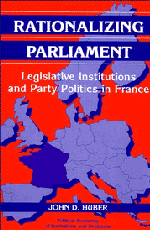Book contents
- Frontmatter
- Contents
- Series editors' preface
- Acknowledgments
- Introduction
- Chapter 1 Parliamentary government in the Fifth Republic
- Chapter 2 Choosing institutions
- Chapter 3 Restrictive procedures and policy conflict
- Chapter 4 Restrictive procedures and bargaining among parties
- Chapter 5 The confidence vote procedure and electoral politics
- Chapter 6 Electoral politics, procedural choice, and the French budget
- CHAPTER 7 Institutional arrangements, political parties, and parliamentary democracy
- Notes
- References
- Index
Chapter 6 - Electoral politics, procedural choice, and the French budget
Published online by Cambridge University Press: 05 December 2011
- Frontmatter
- Contents
- Series editors' preface
- Acknowledgments
- Introduction
- Chapter 1 Parliamentary government in the Fifth Republic
- Chapter 2 Choosing institutions
- Chapter 3 Restrictive procedures and policy conflict
- Chapter 4 Restrictive procedures and bargaining among parties
- Chapter 5 The confidence vote procedure and electoral politics
- Chapter 6 Electoral politics, procedural choice, and the French budget
- CHAPTER 7 Institutional arrangements, political parties, and parliamentary democracy
- Notes
- References
- Index
Summary
This chapter uses qualitative case studies to analyze the argument from the Electoral Politics Model. The case studies focus on the budget debates that occurred in 1988 and 1989, the first two years of Michel Rocard's Socialist minority government. As described in the Introduction, during the 1988 budget debate, Prime Minister Rocard's government made significant policy concessions to the opposition parties, and the budget was adopted without recourse to Article 49.3. Observers and politicians alike proclaimed the renaissance of parliament. One year later, however, Rocard's government made virtually no policy concessions to deputies in the National Assembly, and, following a rancorous parliamentary debate, the budget was adopted under the confidence vote procedure. The central focus of this chapter is to analyze the cause of these changes across the two years, and the usefulness of the Electoral Politics Model in explaining them.
The chapter has six sections. The first contains an argument about methodology and focuses on the role that qualitative case studies can play in the attempt to understand how the confidence vote procedure shapes political behavior in France. The second section describes in detail the legislative behavior and policy choices during the 1988 and 1989 budget debates. The third section draws on interviews with key participants in the budget debates to evaluate the circumstances leading to the adoption of Rocard's budget in 1988 without use of the confidence vote procedure.
- Type
- Chapter
- Information
- Rationalizing ParliamentLegislative Institutions and Party Politics in France, pp. 138 - 177Publisher: Cambridge University PressPrint publication year: 1996



